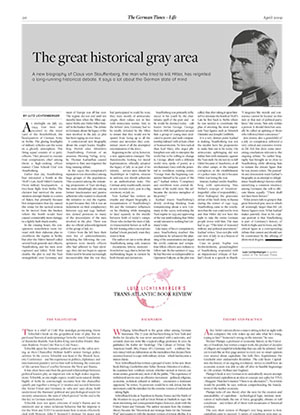Trans-Atlantic Book Review #03
THE NEGOTIATOR
There is a whiff of Cold War nostalgia permeating Horst
Teltschik’s book on the geopolitical state of play. But its profound historical underpinnings form the sturdy foundation of Russisches Roulette. Vom Kalten Krieg zum Kalten Frieden (Russian Roulette. From Cold War to Cold Peace).
Teltschik spent his formative political years in the 1980s serving as then-Chancellor Helmut Kohl’s senior foreign policy advisor. In the 2000s, Teltschik was head of the Munich Security Conference – and his experience in politics, diplomacy and international punditry serves him well in limning the contours of the current lines of conflict between the West and Russia.
It has often been said that the personal relationships between political leaders play an important role in high-stakes negotiations. Teltschik, as one might expect, would seem natural, thinks
highly of Kohl; he convincingly recounts how the chancellor quietly put together a string of 27 treaties and accords between the Soviet Union and Germany in 1989 and 1990 alone. Kohl understood the Russians’ political and psychological needs for security assurances, the sum of which proved “in the end to be the key to German reunification.”
Teltschik does not spare criticism of today’s Russia and its misdeeds and at times nefarious behavior, but his impetus is for the West and NATO to understand how to more effectively deal with Moscow. John F. Kennedy’s strategy for peace was based on first “understanding the interests of one’s opponents, regardless of what one thought of them. Is there anyone who truly believes Russia will just give in without getting anything in return?”
Some of Teltschik’s policy recommendations – dialogue, balancing of interests, building foundations of trust – might come across as diplomatic boiler plate, but his story has compelling historic evidence on its side.
HORST TELTSCHIK: Russisches Roulette. Vom Kalten Krieg zum Kalten Frieden,
C.H. Beck, Munich, 2019
BACKWARDS
Wolfgang Schivelbusch is the great other among German historians. The 77-year-old has been living in New York and Berlin for decades; he was never associated with a university, and certainly does not write like a typical college professor. In 2001, he published Die Kultur der Niederlage (The Culture of Defeat: The American South 1865, France 1871, Germany 1918) – a military history mixed with an elaboration on the mentalities that dictated how societies learned to cope with military defeat – which has become a minor classic.
Now Schivelbusch has written a prequel of sorts. In his new short book Rückzug. Geschichten eines Tabus (Retreat. Histories of a taboo), he examines how a military retreat, whether tactical or forced, can strain armies, generals and, most of all, the public. “The experience of withdrawal sets in once an offensive movement – political, religious, economic, technical, cultural or military – encounters a dominant opponent,” he writes. To persevere would be to risk defeat, but the movement could be mistaken for the extreme version of withdrawal – taking flight.
Schivelbusch looks at Napoleon in Russia, France and the Battle of the Frontiers in 1914 as well as Great Britain at Dunkirk in 1940. His most interesting and consequential chapter, however, deals with the United States and Vietnam. The author recounts how the domino theory became the “theoretical and strategic basis for the Vietnam War” and equates it with the modern version of retreat-phobia. It is an oddity of history, he writes, “retreat-phobia afflicts Goliath, but only seldom David.” The weak are superior to the strong because they can move in any direction and have less to lose. They fight only for themselves, not for the bigger audience – the general public.
Today, in the West, withdrawal has a new name, so as not to hurt national pride. “The term ‘exit strategy’ suggests that everything – including possible failure – had been under control from the very beginning.”
WOLFGANG SCHIVELBUSCH: Rückzug. Geschichten eines Tabus, Carl Hanser Verlag, Munich, 2019
THEORY AND PRACTICE
A New Yorker cartoon shows a man is sitting in bed at night with his computer. His wife wakes up and asks what he’s doing, typing so late? “Someone’s wrong on the internet,” he says.
Werner Plumpe, a professor of economic history at the University of Frankfurt, has written a major work, the product of decades of diligent and insightful scholarship that can only be admired. And yet it reads like an 800-page answer to every not-so-smart opinion ever uttered about capitalism. Das kalte Herz. Kapitalismus: Die Geschichte einer andauernden Revolution (The cold heart. Capitalism: the history of an ongoing revolution) strives to distill how an economic system was able to take off after its humble beginnings in 17th-century Holland and England.
Plumpe’s book is very German in its undoubtedly sincere attempt to understand capitalism as an idea or concept, not a plea for TINA (Margaret Thatcher’s mantra “There is no alternative”). No reform would be possible, he says, without comprehending the foundations of the market economy.
Plumpe ticks off one theory after the next for the creation and sustainability of capitalism – technological logic, intrinsic motivation of individuals, the use of force, geography, climate or soil conditions – and refutes all of them with mountains of historical evidence.
The very short version of Plumpe’s very long answer to how capitalism came to succeed: A variety of conditions were met, i.e. private property enabled market activity, and subsequently through variation and selection, created a model for material reproduction spanning the entire globe.
Plumpe is no Randian apologist; he is well aware of all the problems commonly associated with capitalism, like inequality, exploitation and the plundering of resources. If only real-world capitalism would comply more often with his ever-so-profound theoretical rationale for open and free markets.
WERNER PLUMPE: Das Kalte Herz. Kapitalismus: Die Geschichte einer andauernden Revolution, Rowohlt Berlin Verlag, Berlin, 2019
Lutz Lichtenberger
is senior editor of The German Times.




